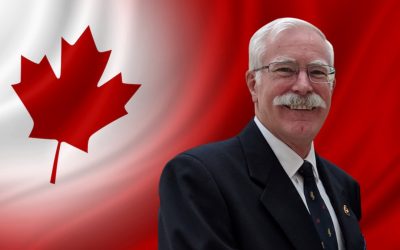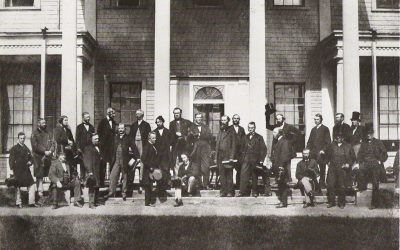Tripoli — When Prime Minister Paul Martin arrives in Libya’s capital Sunday, its streets will be lined with posters reading “Tripoli International Fear.”
It sounds like a reminder of Libya’s dark past, but the seemingly ominous messages are in fact merely poor translations meant to promote a government-run trade fair.
In truth, Mr. Martin will be greeted by a formerly utopian country, once considered the capital of international fear for its bankrolling of terrorist organizations, that has been battered and humbled to the point of desperation by 12 years of international sanctions.
The country’s top officials said in interviews that they are desperate to become a more open and economically liberal society — without questioning the dictatorial rule of Colonel Moammar Gadhafi.
In an exclusive interview with The Globe and Mail, Libyan Prime Minister Shukri Ghanem likened his country to the Soviet Union shortly before the Berlin Wall came down, and said that he would need the help of Canada and similar countries to turn its authoritarian infrastructure into a modern, open economy.
“What we are looking for are good relations with Canada,” Mr. Ghanem said.
“We are looking at Canadian investment and cultural relations being strengthened, because at this moment what Libya needs is foreign revenues and ties with the West.”
His aides said these words were meant to counter the threatening message delivered to Canadian investors by Seif el-Islam Gadhafi, the revolutionary leader’s most prominent son and presumed heir, who told The Globe last week that Ottawa would “pay the price” if it did not apologize for its support of United Nations embargoes against Tripoli.
Mr. Martin’s staff said he would not consider an apology, and Mr. Ghanem acknowledged that Libya’s strange, personality-driven form of government can leave foreign leaders wondering just who speaks for the country.
A respected former OPEC official and Harvard PhD, the cheerful, irreverent Mr. Ghanem was appointed two years ago to transform Libya into a modern economy and open it to the world. But his messages often conflict with those of Col. Gadhafi and his son, both of whom often claim to speak for “the people” who theoretically govern Libya.
“I think the Foreign Ministry is talking in the name of Libya, and Col. Gadhafi is talking for Libya, and I am talking in the name of Libya,” he said. “Of course, sometimes some words are coming from here, some words are coming from there, and they may be misinterpreted but it is not easy now to answer this question of who should be the voice of Libya.”
For the moment, the country’s larger problem is an infrastructure — including an oil industry — that is on the verge of collapse.
In its decades as a rogue state, coming after the establishment of a utopian socialist government in a 1969 military coup, Libya spent billions of dollars bankrolling revolutionary movements, terrorist groups, African and Arab governments and Islamic causes. These projects not only alienated Tripoli from the developed world, but they emptied the country’s oil-fed coffers without producing any lasting changes or useful alliances.
When the United Nations, the United States and the African Union imposed rigid embargoes and sanctions on Libya in the late 1980s and early 1990s, the country was left with a totally state-run economy that was too disorganized and corrupt to exploit its substantial oil reserves or provide proper health and education to its people.
“The Libyans under the embargo discovered many things,” said Miloud Mehadbi, who serves as an ideological voice for Col. Gadhafi as international-affairs director of the World Centre for Green Book Studies. (The Green Book is the revolutionary leader’s manifesto.) “We discovered that the Arabs are not with us. And we discovered that Libya must come first ….. that we have to be guided by realpolitik, not by idealistic visions.”
He said the 1990s were a time of bitter awakening for Libyan leaders. “We paid for Arabs, we paid for Africa, we paid for national liberation movements, we paid for Islamic aid, and after all that, we felt under the embargo that we were completely alone. We paid double, triple, 10 times over for other countries, but still we were alone.”
This realization, rather than fear of an Iraq-style attack by the United States, was the main motive for Libya’s decision to open up to the world and reverse its revolutionary course, Mr. Mehadbi and Mr. Ghanem say.
While Libya was at war with the West, most of its fellow socialist states in Asia and Eastern Europe were abandoning their authoritarian societies and command economies. Libyan citizens were left with state incomes and subsidized goods and services that became increasingly paltry, and an awareness that they were far behind their European and Mideast neighbours.
“We found out, as so many other countries found out before we did, that perhaps the public sector is not conducive to economic development,” Mr. Ghanem said.
“The role of the government should be just the role of a kind of regulator. And then we start encouraging the banks to give more loans, we start privatizing a lot of factories, we try to create more jobs, but not in the government. And personally, I feel that subsidies are something from the past, that they are a distortion of the market. So you should subsidize the income rather than subsidizing the commodities.”
Libya has the potential to become the wealthiest country in Africa. Its vast oil reserves, still largely unexploited, could bring tens of billions of dollars in extra income to its population, which numbers fewer than six million people. Several Canadian companies are bidding on a set of oil properties that are being auctioned for exploitation in January.
Even with the feeble state of its oil industry, Libya reaped a windfall in 2004, a year when crude exceeded $50 (U.S.) a barrel at times. Mr. Ghanem says he is using the money to repair the country’s crumbling infrastructure, with a $14-billion spending program, above and be-yond the country’s $7-billion budget, that is equal to half the country’s $27-billion gross domestic product.
His greatest fear, he said, is that Libya will emerge from being a state-run anachronism, only to become a private-sector kleptocracy.
“I’m trying to avoid the mistakes that took place in Russia and Eastern Europe,” he said. “We don’t want one person to get everything or to become ultra-rich, like what happened to Russia.”
However, he said he has no power — or desire — to transform the system by which one man and his family runs Libya politically.
“My focus is strictly on the economy right now,” he said. “It is frustrating sometimes, and I have a view that I have to work hard to get people to accept. … There are things that I cannot change.”


